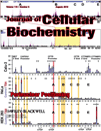
Cell Metabolism
Scope & Guideline
Fostering breakthroughs in cellular metabolism.
Introduction
Aims and Scopes
- Metabolic Pathways and Regulation:
Research on the mechanisms of metabolic pathways, including glycolysis, fatty acid metabolism, and amino acid metabolism, and how these pathways are regulated in health and disease. - Immunometabolism:
Studies exploring the intersection between metabolism and immune cell function, including how metabolic reprogramming influences immune responses and inflammatory diseases. - Microbiome and Metabolism:
Investigations into the role of the gut microbiome in metabolic health, including how microbial metabolites influence host metabolism and disease states. - Nutritional and Dietary Interventions:
Research on the effects of various dietary patterns, fasting, and nutritional interventions on metabolic health and disease prevention. - Metabolism and Aging:
Exploration of how metabolic processes change with age, contributing to age-related diseases and the potential for interventions to promote healthy aging. - Cancer Metabolism:
Studies on the metabolic adaptations of cancer cells, including how alterations in metabolism can influence tumor growth, immune evasion, and treatment resistance. - Cellular and Organismal Metabolism:
Research that examines metabolic processes at both the cellular level and how these processes affect whole-organism physiology.
Trending and Emerging
- Personalized Medicine and Metabolism:
A growing focus on how individual metabolic profiles can inform personalized treatment strategies, particularly in metabolic disorders and cancer. - Metabolic Interventions for Disease Prevention:
Increased research on therapeutic interventions, such as dietary modifications and pharmacological agents, aimed at altering metabolic processes to prevent or treat diseases. - Integration of Multi-Omics Approaches:
Emerging studies utilizing integrated multi-omics approaches (genomics, proteomics, metabolomics) to gain comprehensive insights into metabolic regulation and its implications for health. - Role of Circadian Rhythms in Metabolism:
A rising interest in how circadian rhythms influence metabolic processes and how disruptions in these rhythms can lead to metabolic diseases. - Therapeutic Targeting of Metabolic Pathways in Cancer:
An increasing emphasis on targeting metabolic vulnerabilities in cancer cells as a strategy for developing novel cancer therapies. - Impact of Environmental Factors on Metabolism:
Research exploring how environmental factors, including diet, microbiome, and lifestyle, interact with metabolism and influence health outcomes.
Declining or Waning
- Traditional Metabolic Enzyme Studies:
There seems to be a reduction in studies focused solely on classical metabolic enzymes without considering their broader physiological context or interactions with other cellular processes. - Basic Metabolic Characterization:
Research that primarily describes metabolic pathways without linking findings to disease relevance or translational implications appears to be less frequent, as the field moves towards more integrative and applied studies. - Static Models of Metabolism:
There is a waning interest in static models of metabolism, with a shift towards dynamic and systems biology approaches that capture the complexity of metabolic networks in vivo.
Similar Journals

JOURNAL OF MOLECULAR ENDOCRINOLOGY
Shaping the Future of Endocrinological ResearchJOURNAL OF MOLECULAR ENDOCRINOLOGY, published by BIOSCIENTIFICA LTD, is a prestigious academic journal that has made significant contributions to the fields of endocrinology and molecular biology since its inception in 1988. With an impressive impact factor that places it in the Q1 category for Endocrinology and Q2 for Molecular Biology, this journal is recognized for its rigorous peer-reviewed research that addresses key questions at the intersection of molecular mechanisms and hormonal regulation. The journal's accessibility within the Scopus rankings, notably positioned 45th out of 128 in Endocrinology, highlights its relevance and influence in shaping contemporary scientific discourse. Although the journal does not currently offer open access options, it remains an essential resource for researchers, professionals, and students eager to explore groundbreaking discoveries and advancements in the hormonal sciences. The JOURNAL OF MOLECULAR ENDOCRINOLOGY continues to pave the way for critical exploration and innovation, ensuring its place as a vital publication for the advancement of knowledge in molecular endocrinology.

JOURNAL OF CELLULAR BIOCHEMISTRY
Transforming Knowledge into Breakthroughs in Cellular BiochemistryJournal of Cellular Biochemistry is a premier academic journal dedicated to advancing the field of biochemistry and cellular biology. Published by Wiley, this influential journal has a significant impact factor that underscores its relevance and authority within the scientific community. With its ISSN 0730-2312 and E-ISSN 1097-4644, the journal has been on the frontier of research since its inception in 1982, and is expected to continue publishing cutting-edge studies through 2024. As evidenced by its ranking in the 2023 Scopus Quartiles, it holds a rank of Q2 in Biochemistry and Q3 in both Cell and Molecular Biology, placing it among the top tiers of scientific journals in these disciplines. The Journal of Cellular Biochemistry serves as a vital resource for researchers, professionals, and students alike, providing a platform for the dissemination of innovative ideas and findings that shape our understanding of cellular processes and biochemical pathways. Though it does not currently offer Open Access options, its robust peer-review process ensures that each publication meets the highest academic standards, thus solidifying its esteemed position in the landscape of biochemical research.

BIOCHEMICAL JOURNAL
Advancing the Frontiers of Biochemical ResearchBIOCHEMICAL JOURNAL, published by Portland Press Ltd, stands as a leading publication in the fields of Biochemistry, Cell Biology, and Molecular Biology, reflecting a commitment to advancing scientific knowledge since its inception in 1945. With a distinguished Q1 ranking across these categories and impressive Scopus rankings, the journal serves as an invaluable resource for researchers, professionals, and students alike, facilitating critical discoveries and innovative research practices. Although not currently offering open access, the journal provides a platform for high-quality peer-reviewed articles, ensuring rigorous standards in the dissemination of biochemical research. Spanning over seven decades and continuing through to 2024, the BIOCHEMICAL JOURNAL fosters an environment where cutting-edge biochemical research thrives, supporting the global scientific community's efforts to address complex biological questions and enhance our understanding of fundamental cellular processes.

Journal of Ovarian Research
Exploring breakthroughs in Obstetrics, Gynecology, and Oncology.The Journal of Ovarian Research, published by BMC, is a premier open access journal dedicated to advancing knowledge in the fields of Obstetrics and Gynecology as well as Oncology. Established in 2008, this journal is based in the United Kingdom and has garnered significant attention, evidenced by its impressive Q1 ranking in Obstetrics and Gynecology and Q2 in Oncology as per the 2023 category quartiles. The journal boasts a notable Scopus ranking, placing it at #32 out of 209 in its primary field, showcasing a staggering 84th percentile ranking, indicating its relevance and impact on ongoing research in these disciplines. By facilitating unrestricted access to high-quality research through its open access model, the Journal of Ovarian Research serves as a vital resource for researchers, clinicians, and students alike, fostering collaboration and innovation in ovarian health studies.

FEBS LETTERS
Shaping the Future of Biochemistry and BeyondFEBS LETTERS, published by Wiley, is a prestigious journal that has firmly established its place in the fields of biochemistry, biophysics, genetics, molecular biology, cell biology, and structural biology. With an esteemed history dating back to 1968, this journal continues to be a vital resource for researchers and professionals involved in the biological sciences. It boasts impressive quartile rankings, including Q1 statuses in several categories such as Biochemistry and Genetics, reflecting its high impact factor and significant contribution to scientific discourse. FEBS LETTERS provides a platform for innovative findings and critical reviews, fostering the exchange of knowledge and ideas within the scientific community. Although it operates under a subscription model, the journal ensures broad dissemination of groundbreaking research through its rigorous peer-review process. The vibrant discussions encouraged by articles published in FEBS LETTERS aim to inspire current and future generations of scientists to push the boundaries of biological understanding, making it an indispensable resource for anyone dedicated to advancing their knowledge in these dynamic fields.

CELLULAR & MOLECULAR BIOLOGY LETTERS
Pioneering Research in Biochemistry and Cell BiologyCELLULAR & MOLECULAR BIOLOGY LETTERS, published by BMC, is a premier open-access journal dedicated to disseminating high-quality research in the fields of Biochemistry, Cell Biology, and Molecular Biology. Established in 1996, the journal has emerged as a leader in its domain, boasting an impressive Q1 ranking across three critical categories as of 2023, reflecting its significant impact within the scientific community. With an ISSN of 1425-8153 and an E-ISSN of 1689-1392, it offers accessible research findings to a global audience, having been open access since 2013. Situated in the United Kingdom, at CAMPUS, 4 CRINAN ST, LONDON N1 9XW, the journal continues to serve as a vital resource for researchers, professionals, and students, contributing to advancements in the understanding of cellular and molecular processes. By providing a platform for original research, reviews, and short communications, CELLULAR & MOLECULAR BIOLOGY LETTERS plays a crucial role in fostering dialogue and collaboration within the scientific community.

AMERICAN JOURNAL OF PHYSIOLOGY-ENDOCRINOLOGY AND METABOLISM
Advancing insights into endocrinology and metabolism.American Journal of Physiology-Endocrinology and Metabolism, published by the American Physiological Society, stands as a leading platform for disseminating high-quality research in the fields of endocrinology, diabetes, and metabolism, as well as general physiology. With an impressive impact factor placing it within the Q1 category across multiple relevant disciplines (Endocrinology, Diabetes and Metabolism; Physiology; and Medical Physiology), this journal reflects its authoritative position in the scientific community. Spanning from 1980 to 2024, the journal consistently publishes groundbreaking studies and significant findings that advance our understanding of hormonal regulation and metabolic processes. Although it does not currently offer open access, it provides valuable resources for researchers, professionals, and students alike, eager to stay at the forefront of advancements in physiological sciences. Addressed in Rockville, Maryland, its commitment to excellence and rigorous peer review ensures that every article contributes essential insights to the field.

POSTEPY BIOLOGII KOMORKI
Advancing the Frontiers of Cell BiologyPOSTĘPY BIOLOGII KOMÓRKI is a pivotal journal in the field of cell biology, published by the renowned Polskie Towarzystwo Anatomiczne. Since its inception, this journal has been dedicated to advancing scientific knowledge through the dissemination of high-quality research articles, reviews, and original studies focused on cellular structure and function. Although POSTĘPY BIOLOGII KOMÓRKI does not currently operate as an open-access journal, it remains a significant resource for researchers and professionals alike, contributing to critical discussions and findings in the biological sciences. The journal has undergone coverage discontinuation in Scopus, yet it continues to serve as an essential platform in Poland for scholarly exchange in cellular and anatomical research. Situated at the Centrum Medyczne Kształcenia Podyplomowego in Warsaw, it aims to bridge gaps in understanding and nurture academic growth among students and professionals in the biological sciences.

BIOCHEMICAL AND BIOPHYSICAL RESEARCH COMMUNICATIONS
Where critical insights meet scientific excellence.BIOCHEMICAL AND BIOPHYSICAL RESEARCH COMMUNICATIONS, published by Academic Press Inc Elsevier Science, stands as a leading periodical in the fields of biochemistry, biophysics, cell biology, and molecular biology. With an ISSN of 0006-291X and an E-ISSN of 1090-2104, this esteemed journal has been a pivotal platform for the dissemination of groundbreaking research since its inception in 1959, continuing to publish influential findings through at least 2024. It holds a commendable Q2 ranking in Biochemistry and Q1 status in Biophysics as of 2023, reflecting its high impact and relevance in the field, supported by its strong Scopus rankings—ranking #43 in Biophysics and maintaining a presence in the top quartiles of several related categories. Although it is not an open-access journal, it provides critical insights and essential data that cater to researchers, professionals, and students keen on advancing their understanding of complex biochemical and biophysical processes. Its significant contributions to the scientific community underscore the importance of this journal as a reference point for innovative research and collaborative discourse.

Science Immunology
Exploring the Depths of Immune ResponsesScience Immunology, published by the American Association for the Advancement of Science, is a leading journal in the field of immunology, recognized for its significant impact and rigor in advancing our understanding of immune responses and complex diseases. With an impressive impact factor that places it in the Q1 category of both immunology and allergy, as well as miscellaneous medicine, this journal is ranked #7 and #8 in their respective Scopus categories, reflecting its high-quality research output. Since its inception in 2016, Science Immunology has been at the forefront of interdisciplinary immunological research, fostering crucial insights that link immunology with pressing health challenges. The journal is committed to providing open access to its content, ensuring that groundbreaking findings are accessible to a global audience of researchers, professionals, and students. Its anthology not only addresses fundamental immunological mechanisms but also enhances the dialogue on translational applications and therapeutic interventions, solidifying its position as an essential resource within the scientific community.